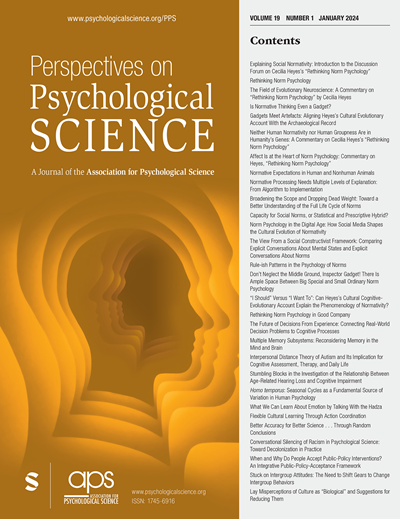Better Accuracy for Better Science . . . Through Random Conclusions.
IF 10.5
1区 心理学
Q1 PSYCHOLOGY, MULTIDISCIPLINARY
Perspectives on Psychological Science
Pub Date : 2024-01-01
Epub Date: 2023-07-19
DOI:10.1177/17456916231182097
引用次数: 0
Abstract
Conducting research with human subjects can be difficult because of limited sample sizes and small empirical effects. We demonstrate that this problem can yield patterns of results that are practically indistinguishable from flipping a coin to determine the direction of treatment effects. We use this idea of random conclusions to establish a baseline for interpreting effect-size estimates, in turn producing more stringent thresholds for hypothesis testing and for statistical-power calculations. An examination of recent meta-analyses in psychology, neuroscience, and medicine confirms that, even if all considered effects are real, results involving small effects are indeed indistinguishable from random conclusions.
提高准确性以改进科学..........通过随机结论
由于样本量有限,经验效果较小,因此以人为对象开展研究可能很困难。我们证明了这一问题会产生实际上与掷硬币确定治疗效果方向无异的结果模式。我们利用这种随机结论的想法来建立一个解释效应大小估计值的基线,进而为假设检验和统计能力计算设定更严格的阈值。对心理学、神经科学和医学领域最新荟萃分析的研究证实,即使所有考虑的效应都是真实的,涉及小效应的结果也确实与随机结论无异。
本文章由计算机程序翻译,如有差异,请以英文原文为准。
求助全文
约1分钟内获得全文
求助全文
来源期刊

Perspectives on Psychological Science
PSYCHOLOGY, MULTIDISCIPLINARY-
CiteScore
22.70
自引率
4.00%
发文量
111
期刊介绍:
Perspectives on Psychological Science is a journal that publishes a diverse range of articles and reports in the field of psychology. The journal includes broad integrative reviews, overviews of research programs, meta-analyses, theoretical statements, book reviews, and articles on various topics such as the philosophy of science and opinion pieces about major issues in the field. It also features autobiographical reflections of senior members of the field, occasional humorous essays and sketches, and even has a section for invited and submitted articles.
The impact of the journal can be seen through the reverberation of a 2009 article on correlative analyses commonly used in neuroimaging studies, which still influences the field. Additionally, a recent special issue of Perspectives, featuring prominent researchers discussing the "Next Big Questions in Psychology," is shaping the future trajectory of the discipline.
Perspectives on Psychological Science provides metrics that showcase the performance of the journal. However, the Association for Psychological Science, of which the journal is a signatory of DORA, recommends against using journal-based metrics for assessing individual scientist contributions, such as for hiring, promotion, or funding decisions. Therefore, the metrics provided by Perspectives on Psychological Science should only be used by those interested in evaluating the journal itself.
 求助内容:
求助内容: 应助结果提醒方式:
应助结果提醒方式:


